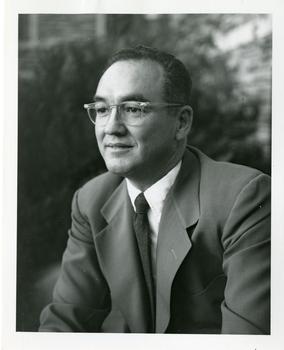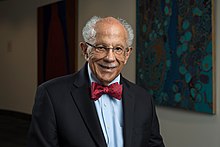The University Corporation for Atmospheric Research (UCAR) is a US nonprofit consortium of more than 100 colleges and universities providing research and training in the atmospheric and related sciences. UCAR manages the National Center for Atmospheric Research (NCAR) and provides additional services to strengthen and support research and education through its community programs. Its headquarters, in Boulder, Colorado, include NCAR's Mesa Laboratory, designed by I.M. Pei.

Kevin Edward Trenberth worked as a climate scientist in the Climate Analysis Section at the US National Center for Atmospheric Research (NCAR). He was a lead author of the 1995, 2001 and 2007 IPCC assessment reports. He also played major roles in the World Climate Research Programme (WCRP), for example in its Tropical Oceans Global Atmosphere program (TOGA), the Climate Variability and Predictability (CLIVAR) program, and the Global Energy and Water Exchanges (GEWEX) project.

The US National Center for Atmospheric Research is a US federally funded research and development center (FFRDC) managed by the nonprofit University Corporation for Atmospheric Research (UCAR) and funded by the National Science Foundation (NSF). NCAR has multiple facilities, including the I. M. Pei-designed Mesa Laboratory headquarters in Boulder, Colorado. Studies include meteorology, climate science, atmospheric chemistry, solar-terrestrial interactions, environmental and societal impacts.

Walter Orr Roberts was an American astronomer and atmospheric physicist, as well as an educator, philanthropist, and builder. He founded the National Center for Atmospheric Research and took a personal research interest for many years in the study of influences of the Sun on weather and climate.
Roger Willis Daley was a British meteorologist known particularly for his work on data assimilation.
Antonio Busalacchi Jr. is the eighth president of the Boulder, Colorado-based University Corporation for Atmospheric Research. He began serving as UCAR president in August 2016.

Joachim Kuettner, also spelled Küttner, was a German-American atmospheric scientist.

David Atlas was an American meteorologist and one of the pioneers of radar meteorology. His career extended from World War II to his death: he worked for the US Air Force, then was professor at the University of Chicago and National Center for Atmospheric Research (NCAR), researcher at NASA and private consultant. Atlas owned 22 patents, published more than 260 papers, was a member of many associations, and received numerous honors in his field.
Robert Earl Dickinson is an American meteorologist and geoscientist.

Roger M. Wakimoto is an atmospheric scientist specializing in research on mesoscale meteorology, particularly severe convective storms and radar meteorology. A former director of the National Center for Atmospheric Research (NCAR), Wakimoto in November 2012 was appointed as assistant director of the Directorate for Geosciences (GEO) of the National Science Foundation (NSF).
Joseph Bernard Klemp is an American atmospheric scientist who collaborated in groundbreaking work advancing numerical simulation techniques and uncovering the dynamics of atmospheric convection, including supercell thunderstorms, tornadoes, squall lines, as well as mountain waves.
Paul Rowland Julian, a Fellow of the American Meteorological Society, is an American meteorologist who served as a longtime staff scientist at the National Center for Atmospheric Research (NCAR), was co-author with Roland Madden of the study establishing the Madden–Julian oscillation (MJO), and contributed to the international, multi-institutional Global Atmospheric Research Program (GARP), Tropical Wind, Energy Conversion, and Reference Level Experiment (TWERLE), and Tropical Ocean-Global Atmosphere (TOGA) meteorology research programs. The MJO meteorologic phenomenon he co-discovered is the largest element of the intraseasonal variability in the tropical atmosphere, a traveling pattern arising from large-scale coupling between atmospheric circulation and tropical deep convection. Description of the MJO remains an important contribution to climate research with relevance to modern short- and long-term weather and climate modeling.
Julie Michelle Arblaster is an Australian scientist. She is a Professor in the School of Earth, Atmosphere and Environment at Monash University. She was a contributing author on reports for which the Intergovernmental Panel on Climate Change (IPCC) was a co-recipient of the 2007 Nobel Peace Prize. Arblaster was a lead author on Chapter 12 of the IPCC Working Group I contribution to the IPCC Fifth Assessment Report in 2013. She has received the 2014 Anton Hales Medal for research in earth sciences from the Australian Academy of Science, and the 2017 Priestley Medal from the Australian Meteorological and Oceanographic Society. She has been ranked as one of the Top Influential Earth Scientists of 2010-2020, based on citations and discussion of her work.
Francis Patton Bretherton was an applied mathematician and a professor emeritus of the Department of Atmospheric and Oceanic Sciences at the University of Wisconsin, Madison.
Richard A. Anthes was a long time president of the University Corporation for Atmospheric Research. The Anthes Building in Boulder, Colorado, is the first UCAR-owned building to be named for an eminent scientist – and a living one at that.” His area of study at the University of Wisconsin, Madison, focused on hurricanes and tropical cyclones. Dr. Anthes taught as a professor for ten years at Pennsylvania State University before accepting a position at the National Center for Atmospheric Research as director of the Atmospheric and Prediction Division in 1981, a position he kept until 1986 when he became director of NCAR. In 1988, he started working as president of UCAR, and retired from that position in 2012. During his presidency at UCAR, he participated or chaired over forty different national committees for agencies such as NASA, NSF, and NOAA. He also established a program aimed at increasing participation in the atmospheric sciences called SOARS .
Venkatachalam Ramaswamy is the Director of the Geophysical Fluid Dynamics Laboratory of the National Oceanic and Atmospheric Administration (NOAA) Office of Oceanic and Atmospheric Research (OAR), studying climate modeling and climate change. "A leading climate scientist", his work is cited as supporting evidence for significant stratospheric climate change. He focuses in particular on radiative transfer models and the hydrologic cycle in the atmosphere. He has actively supported the development of supercomputing approaches that enable researchers to achieve higher resolution and greater complexity in climate models. As a lead author involved in the Intergovernmental Panel on Climate Change (IPCC), Ramaswamy's contributions was recognised by the joint award of the 2007 Nobel Peace Prize to the IPCC.
Maura E. Hagan is a Professor of Physics and Dean of the College of Science at Utah State University. She is a Fellow of both the American Meteorological Society and the American Geophysical Union, and was elected a member of the National Academy of Sciences in 2019.
Roland Aloysius Madden, an American meteorologist, was a staff scientist at the National Center for Atmospheric Research (NCAR) from 1967 to 2002. His research centers on diagnostic studies of the atmosphere. Madden is a fellow of the American Meteorological Society (AMS) and a recipient of the 2002 Jule G. Charney Award of the AMS.

Everette Joseph is an American atmospheric scientist who serves as the director of the National Center for Atmospheric Research (NCAR) in Boulder, Colorado.
Guy P. Brasseur is a Belgian meteorologist and climate scientist. His research interests include stratospheric ozone depletion, global air pollution, solar-terrestrial interactions and earth system research.







